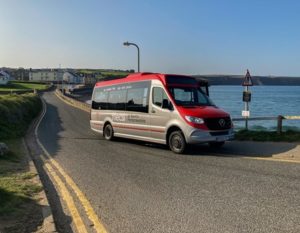Collaborative mobility charity CoMoUK has called on the Scottish government to introduce on-demand bus services for communities cut-off by reductions in local services.
In a proposal submitted to the rural economy and connectivity committee, CoMoUK has requested for a flexible bus initiative enabling operators to use demand-responsive technology linking local buses with passengers who need them.
According to CoMoUK, there are similar schemes in the UK including Flex Tees in Tees Valley and Go Coach in Kent, which connect passengers with essential services and, during the pandemic, has kept key workers moving.

Similarly, in Newport the ‘fflecsi’ system has replaced some scheduled local buses with more flexible services. Buses are ordered either via a mobile phone app or by calling a phone number, rather than following a set timetable at fixed bus stops.
Lorna Finlayson, Scotland director of CoMoUK, said: “There is the chance to think outside the box, and a flexible on-demand bus system could be of huge benefit. It would match up the increasingly empty spaces on buses with the very people who need those services, at the time they need them.
“People in urban and rural areas whose services may have been reduced or removed altogether could use technology to ‘order’ a bus, which could then be used right across their community.”
The proposal features areas designed to include key destinations such as hospitals and supermarkets, with on-demand buses able to deal with ongoing affordability concerns of subsidised routes.
According to the charity, bus travel was in decline before Covid-19, with a drop in passenger numbers of around 100 million since 2008, as many services struggled to attract passengers.
Furthermore, CoMoUK urged the Scottish government to back more car-sharing and bike-sharing initiatives, as well as to create mobility hubs for various forms of shared transport across the country.
Finlayson added: “We are at a critical point with public services funding and the need for a greener environment.
“We should use this moment to embed the shifting attitudes and commuter behaviour that occurred during lockdown to erode the dominance of the private car and pursue a sustainable, inclusive and affordable transport system that benefits everyone.”





